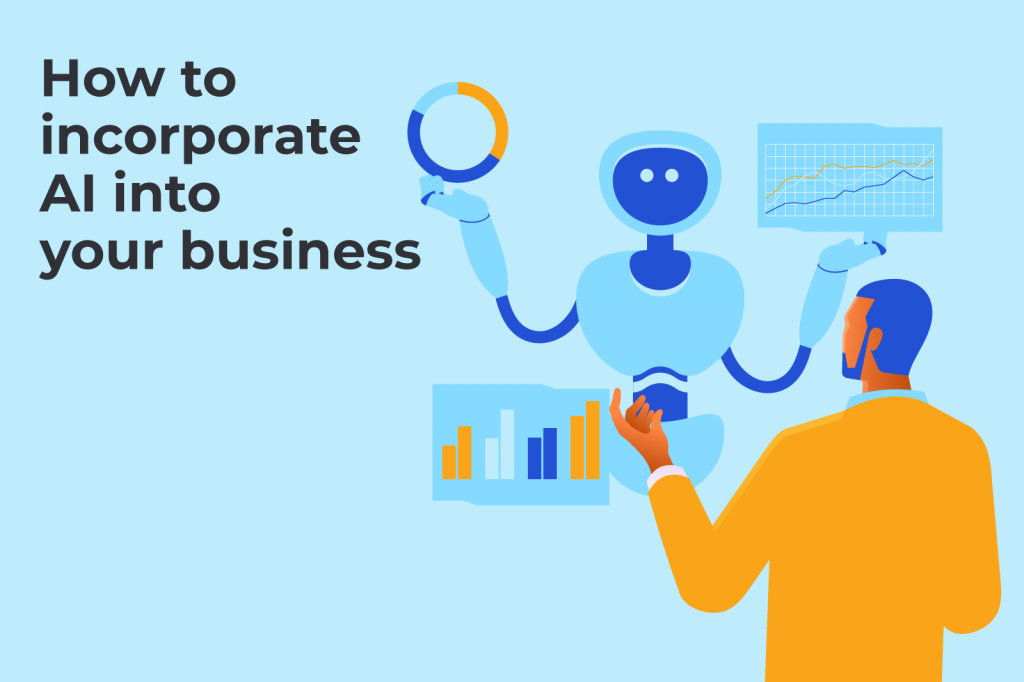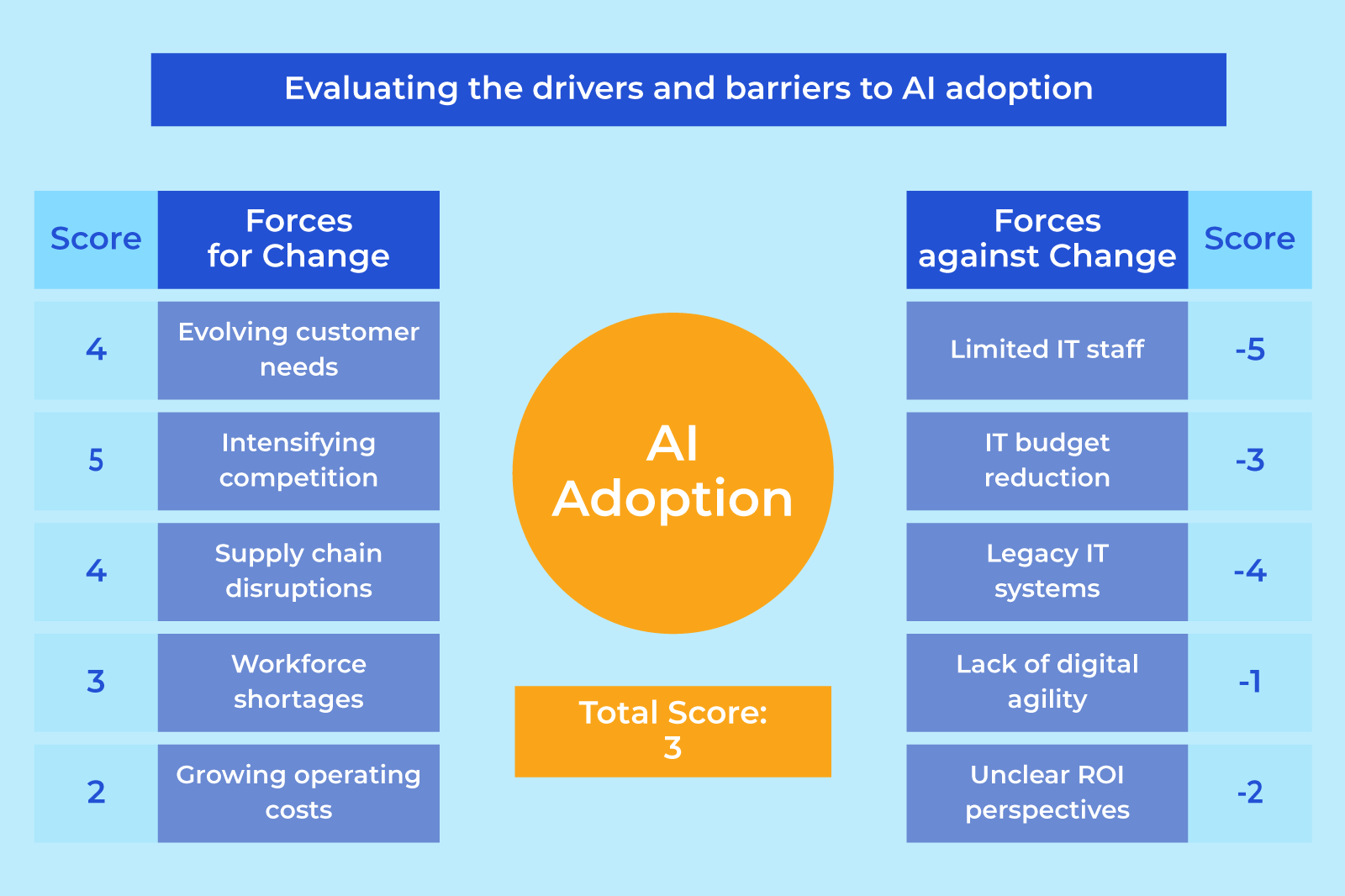
How to incorporate AI into your business
Like it or not, AI is probably here to stay, and it will probably have a major impact on businesses in the following years. You might already use ChatGPT for some simple office tasks or at least know a colleague who does. New studies suggest that AI can improve workers' performance by as much as 40% compared to those who don’t use it - so the road is paved for mass adoption sooner rather than later. With this in mind, we asked our colleagues at Ontegra to describe how any company should consider including AI in their business. Here’s what we found out:
Research for your specific AI business opportunities
The first thing we suggest doing when evaluating how AI should or could be incorporated into your business is to research and try to determine the everyday activities of your team/business. For simplicity, you can organize them in two columns: one that will be filled with time-consuming tasks that are not critical and don’t bring much-added value, and others that are also time-consuming but add high value.
After you have the list done, you should look at the activities that are time-consuming but don’t bring a lot to the table - those might be things like writing emails or responding to customer inquiries. You want to focus on these because the objective is to use that saved time for critical/essential things such as generating creative solutions, developing new products and services, and so on.
To make things easier for you at this stage, we recommend using SOPs (Standard Operating Procedures) to break down every task and activity and identify where AI could intervene or take over completely.
Here’s an example: You're analyzing your customer support activities. Your present SOP might look like this:
- You receive inquiries from your customers from different channels such as email, phone, or chat;
- Your team needs to categorize and prioritize the received inquiries;
- Your team replies to the most customer inquiries;
- If an inquiry needs a higher level of support, then that is escalated to a different department.
To transition it to AI, take every step from your SOP and think about where AI could be included - do it only if it makes sense for your business (not for the sake of implementing AI). To continue our example, this is how your new SOP might look like:
- You implement an AI-powered chatbot that offers 24/7 support based on a knowledge database;
- Use a sentiment analysis system to prioritize the inquiries based on the urgency detected in the customer’s language;
- Create and integrate a ticketing system based on machine learning that automatically routes complex issues to the appropriate support level.
Create clear goals/objectives for an AI business implementation
After you have your set of tasks or activities that you think could be automated via AI, we encourage you to conduct meetings with your teams and colleagues who might benefit from them directly or indirectly. With their help, you should understand how a successful implementation should look like, what metrics and KPIs will be the most important to track, and what the actual ROI (return on investment) will look like. Transform all that information into clear goals that are easy to track and evaluate.
Define your business AI-readiness
At this point, based on your business specifics, you should analyze how ready your company is for an AI implementation and whether you could conduct it yourself.
Based on our previous experience, these are the most common scenarios:
- A company wants to implement AI in its business but lacks expertise and an internal team to develop those solutions. This situation is common to companies that are not software providers themselves;
- The company is a custom software development company with an internal development team but lacks staff availability or extended know-how on AI software development;
- The company doesn’t have extensive AI business requirements; thus, custom AI solutions might not be needed at this point.
In the first two scenarios, we encourage companies to go a bit further to evaluate their readiness - below the Force Field Analysis by Kurt Lewis is a great tool for this purpose. If limited IT staff or extensive knowledge of AI software development are key factors that lower your company score, be assured you have a great partner by your side in our team who specializes in developing AI software solutions.

Research and evaluate AI software development providers
Like any other software project, we encourage you to research potential partners that meet your requirements. Here are some points we believe are essential:
- The AI software provider's experience - but most importantly, their experience in your industry;
- Time differences if you consider outsourcing from another country or even continent. Also, take into account the cultural differences and similarities;
- If it’s an off-the-shelf solution - analyze the customization options of the solution, the data security measures they have in place, and the potential ROI. See if they have case studies made on clients from your industry.
Create an internal plan for implementation
Based on the objectives defined before, you should create a plan of implementation that should contain the following:
- Create a project plan and timeline with your implementation team or external provider. This should include milestones and deliverables;
- Assign clear roles and responsibilities for each team member. Make sure that the assigned responsibilities are in line with their skills and the resources they have available;
- Include a backup plan if something goes wrong - evaluate potential risks and develop a contingency plan from this stage.
Show me the data - evaluate the needed data and it’s scale
This is one of the most critical points you should consider before implementing AI in your business processes. AI solutions require vast amounts of data, and their level of quality is also critical in determining their success. Discuss internally or with your AI software development vendor to assess your data sources and their quality. We recommend the following:
- Determine if you have enough available data or if its quality is high enough. If not, then devise a plan to collect more or improve it to the required level;
- Ensure your data is accurate enough using data cleaning and preprocessing techniques provided by your internal team or outsourced partner;
- Don’t take any chances before starting the project - work with data scientists to analyze your data to identify potential problems - this will pay dividends afterward because this directly impacts the quality of your AI business solution.
Start small and scale accordingly
You have a well-made implementation plan, clear objectives, a prepared internal team or outsourcing AI software development partner, and clean data to feed your solution. While all that sounds good, we recommend starting small with a pilot project. You can implement the solution in a small fraction of your company; this way, your business processes will not be negatively impacted even if things don’t work as expected. The pilot project will allow you to identify minor issues, correct them, gather feedback from your team, and refine your solution. You can scale it for the entire organization if it's a success.
Create a framework and procedures for the use of AI in your business
Just because you have a well-made AI business solution doesn’t mean it will output the best possible results without clear usage guidelines and business procedures. Ensure you have suitable data security systems and protocols in place. Don’t forget that you will most likely need to adapt them as AI solutions will become a more critical part of your business processes.
Benefits of AI in Business
Better efficiency - You can automate repetitive tasks so that you and your team can focus on the high-value ones that require human expertise and creativity.
Better Risk Management - Your business can truly benefit from having an “all-seeing eye” over your data - it can detect anomalies and patterns easily and faster, thus mitigating risk.
More personalization - Personalization is the promised “holy grail” for marketers and businesses alike, especially for those in the B2C area, but before generative AI, it was challenging to implement. AI can help you tailor your messaging and experiences based on customer preferences and behaviors.
Improved customer satisfaction - With AI-powered chatbots, you can genuinely offer 24/7 customer support - and one that is not dull to chat with. They can handle most customer inquiries if you feed them enough information about your business processes.
Improved speed and accuracy - This one is a no-brainer, as AI models can read, interpret, and analyze an outstanding volume of data faster and more accurately than we can.
Fuels Innovation - AI can enhance innovation not through the actual generation of ideas but because it can act as an assistant fueling your team's creative processes through research and insights.
Informed Decision-Making - Keeping the realm of data and insights, besides fueling creativity, they can also be used in a more informed and faster decision-making process for executives.
A real competitive advantage - Integrating AI into business is still quite a new principle, and few companies even consider including AI in their business operations. This creates an opportunity for early adopters compared to those who don’t use the latest technologies.
Conclusion - How to incorporate AI into your business
No matter your scenario, if you can create a custom AI business solution in-house or outsource it to an AI software development company, its actual success in palpable business results is based on the steps taken before, such as analyzing what activities could truly benefit from AI, creating clear objectives, assessing your business AI readiness, evaluate your internal team or external partners and many more that we discussed in this article. Furthermore, defining the amount of data and its quality needed for your AI solution and then actually providing it is absolutely critical - we can’t stress more how important this part is - that’s why we encourage you to prioritize this component and not rush to development until you have this part covered. All the information provided should help you understand AI's role in your business and help you jumpstart your own AI business project.
We at Ontegra have decades of combined experience developing custom software solutions with complex applications in many industries, such as Big Pharma, Construction, Industrial Production, Automotive, HR, and much more. We also have a dedicated expert AI software development team with its own NLP API that can help you through the entire process, from research to launch and maintenance. Contact us; we’d love to hear about your business and find new ways to include AI in your business processes.
Article written by Iulia Filimon, NLP Engineer
Iulia designs and develops algorithms and models that enable computers to understand, interpret, and generate human language. She participates in building the first innovative AI company's solutions and exposing them to clients.